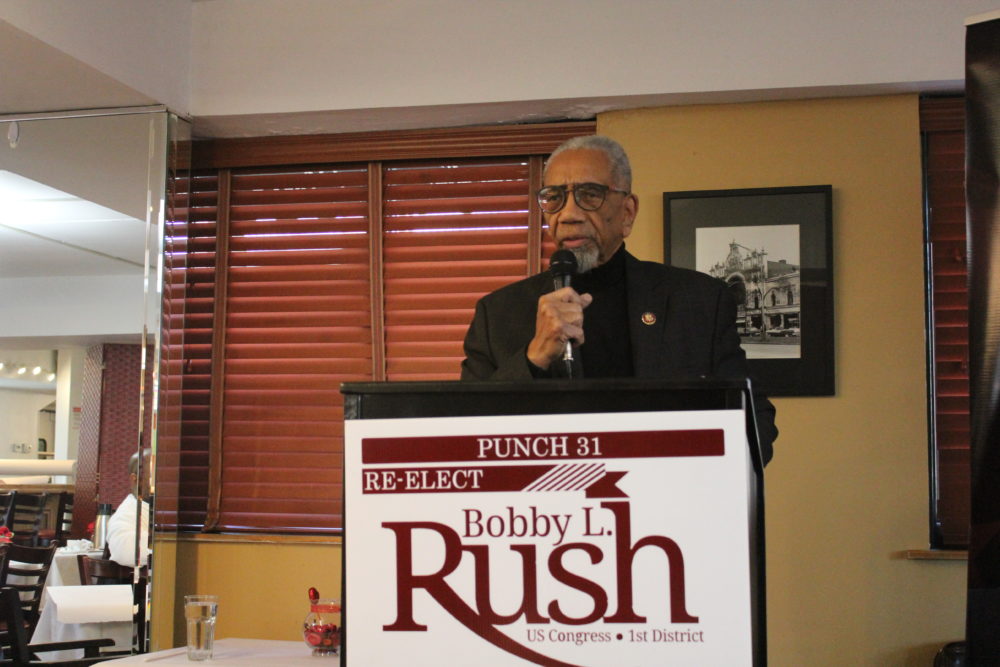Two priorities one South Side congressman said he plans to fight for, if re-elected this year, is new legislation to help create more black-owned banks and to make participation in lynching a federal crime. “I live the life I love and I love the life I live and with that I plan to win re-election in November and keep doing what the voters want me to do and that’s fight for them in Washington,” said U.S. Rep. Bobby Rush (D-1st), who turns 74-years-old in November. “Therefore, retirement will have to wait a while.”
Rush hosted a Friday breakfast meeting at Pearl’s Place in Bronzeville with the Black Press to discuss his political agenda for his next term.
“Blacks are great consumers because we spend a lot of money buying goods and services but we rarely own anything and that’s because we can’t get loans from traditional banks and other financial institutions,” contends Rush, who serves as chairman of the House subcommittee on Energy. “I remember when there were seven or eight black-owned banks in Chicago and now there’s only one. And nationally, there are only 23 black-owned banks and that’s not enough.”
GN Bank, which opened in 2000 and has a branch in Chatham and Bronzeville, is the only-black-owned bank in Chicago following the 2017 collapse of Seaway Bank & Trust Co., once the largest black-owned bank in Illinois (based on assets).
Last January, Rush introduced The Rescue Act (H.R. 41) as a way to “to provide regulatory relief for black and community banks, to codify the Minority Bank Deposit Program, and for other purposes,” Rush stated as the bill’s chief sponsor. “This bill would encourage affordable lending, expand the use of minority banks and low-income credit unions.”
According to its website, the Minority Bank Deposit Program is a voluntary program aimed at encouraging minority-owned banks, women-owned banks and credit unions that serve low-income communities to become depositaries and financial agents.
But leveling the ‘playing field’ for blacks with financial institutions is one goal Rush is targeting during his next term. Rush said during the 1960s when he co-founded the Illinois chapter of the Black Panthers he fought for black equality, and now he is fighting for federal legislation that prohibits lynching.
“I expect next week that my Emmett Till Anti-Lynching bill will be called up for a vote in the House because there are no federal statues on lynching,” said Rush, who recently endorsed former New York Mayor Michael Bloomberg for president. “And once it passes the Senate I have full confidence that President Trump will sign it because it would be in his interest to sign it.”
White House Press Secretary Stephanie Grisham did not return calls seeking comment.
Emmett Till was a 14-year-old black boy from Chicago’s South Side that was lynched in 1955 after he allegedly whistled at a white girl while inside a Mississippi grocery store. After his alleged killers, all white, were acquitted by an all white jury his death sparked violent protests by blacks across America.
Lynching is a murder demonstration by a group of people (usually whites) using extrajudicial action. After the American Civil War an increase in lynching occurred, but then it decreased in the late 1930s shortly after the emancipation of slaves, according to historians. Mostly black men from the South were lynched although women and non-blacks were also lynched.
For Rush, he also plans to fight to secure Medicare for everyone; help pass gun trafficking legislation; and continue fighting to secure funding for his district and “for all of urban America,” he said.



